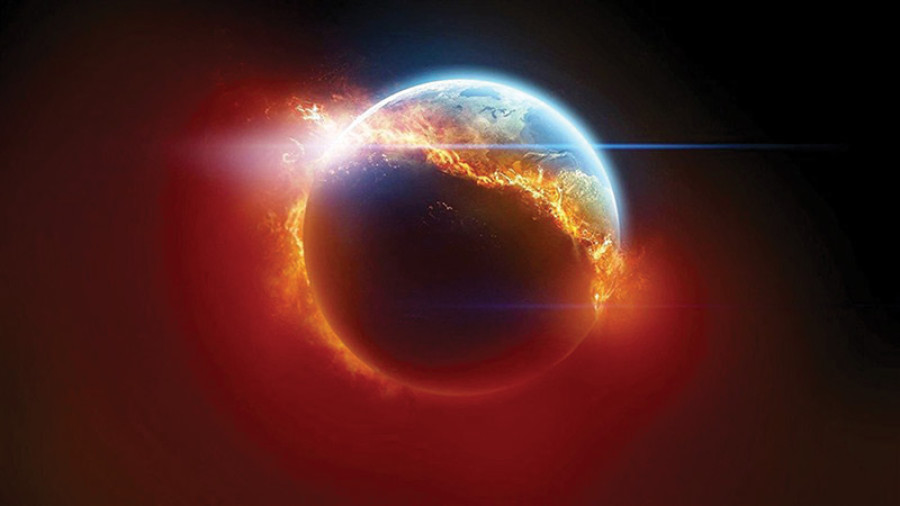Opinion
Reflections on a burning planet
4.5 billion years of geological transformations, explosions of biodiversity and a menagerie of evolutionary adaptations, and now the earth is dying.
Hitesh Pant
4.5 billion years of geological transformations, explosions of biodiversity and a menagerie of evolutionary adaptations, and now the earth is dying. The fossil economy has trapped us within a system that blindly accepts the idea of infinite growth, all the while creating a sharp rift between the earth’s biogeochemical cycles and the planned obsolescence of our manufactured commodities. The result: a toxic planet, unable to adapt to the relentless extraction of mineral resources.
But fear not, that recently sourced lithium will certainly make its way into your fingertips in the form of a glistening new iPhone X, and that’s what matters isn’t it? We flaunt and imbue ourselves in conspicuous consumption, because we have been tamed into accepting a particularly treacherous form of personal choice. It grants us the freedom to consume, but denies us the thought of collective responsibility.
New god
The biological annihilation of the planet is occurring at an extreme rate: more than 50 percent of wild species have been exterminated over the past 40 years. Mass extinction is an undeniable force, a punishing juggernaut that has torn ecosystems apart across the world’s terrestrial and marine environments. By 2050, the oceans will contain more plastic by weight than fish, a consequence of the fact that 20,000 plastic bottles are bought every second. We have granted plastic omnipotence, and it is threatening to kill our most cherished natural resources. It is more sickening to realize that the executioner’s black hand lies solely with us, Homo sapiens. It would be a gross misapprehension to assume that our actions are bereft of consequences.
Propitiated by the demagogues as a divine right, and wilfully exploited by the industries that we ostentatiously disavow on social media, the relentless surge of hyper-individualism has scarred the planet. But it won’t kill it. It is we who will breathe our last breaths, because it is our life-support systems that are perishing. Natural selection will ensure an evolutionary stable system by replacing our bloated vestibules with organisms more conducive to the new burning environment. If there ever was a time for deux ex machina to purge our reality of this cancer, it won’t find a better moment than this.
The struggle for survival is on-going, and it is increasingly marked by bloodshed. There are thousands of Berta Caceres’s across the world, methodically hunted and killed by state-sponsored death squads for opposing the destruction of their socio-ecological systems and standing for the right of self-management. There are millions like the first people of Standing Rock, indigenous groups that want to preserve the natural world and their right to exist from the endless profit motive of the state-industrial complex.
Power within us
This dialectic struggle is not obtuse and abstract. It is real, it is increasing, and it is our responsibility to combat these injustices. It is our responsibility because we still remain silent as individuals when confronted with the scientific consensus on climate change. It is our responsibility because it is the manufactured obsession to accrue more wealth, and to consume beyond our means, which has had cascading effects on both human and non-human entities. We enjoy the creature comforts of urban life, aware of the on-going local and global ecological disasters, yet we make sure that our intermittent critique of the economic system absolves us from making the crucial lifestyle changes needed to halt the destruction of our collective home.
We must recognise that we have the power to construct a better world, and we must realise the fact that our actions do not occur within a vacuum of simplified human relationships as producers and consumers. The economy thrives on the metabolism of the natural world, and our persistence to be silent and to obey the annals of the free-market has reduced its ability to regenerate. We have created rippling existential effects, from the communities in southern Nepal drowning in the increasingly intense climate-induced monsoon, to the millions in sub-Saharan Africa burning from famine and drought.
We need to stand against faulty thinking and the structural imbalances that continue to value the lives of the few over the many. We need to raise our collective consciousness to recognise that we can construct a better future for the people and the planet. This rests in resisting the temptation to fetishize our commodities.
This is not utopian thinking. Utopias do not lend themselves to thinking. They are absolute, definite, and crush the spirit of individual thought that is necessary for collective change. Utopias are wanted for by the very groups responsible for much of the world’s ecological crises: for them, human disasters are a means to a greater end, an end of more wealth. Everything seems to be expendable in the pursuit of this self-proclaimed rational interest. But there is nothing rational about wanting a death wish for the planet.
It is imperative that we fight to find alternatives beyond the current system. “I am a partisan, I am alive, and I feel the pulse of the activity of the future city that those on my side are building is alive in their conscious”. These words by Antonia Gramsci struck at the heart of the individual activist, recognising her stridence in taking up a cause whose defence had universal ramifications. The onus is on us to carry this thought into action against the machine that threatens our survival.
- Pant writes about environmental conflicts for “Elifiteri Exarcheia”, a Greek pamphlet




 9.89°C Kathmandu
9.89°C Kathmandu










